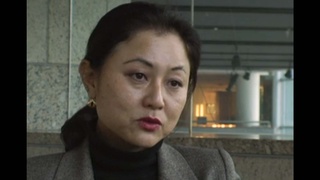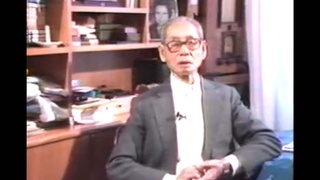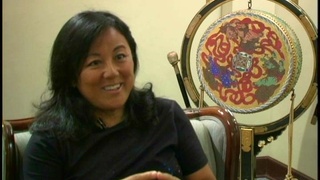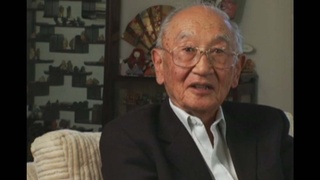Interviews
Evacuation
We could take... I believe it was sixty pounds. We couldn't take very much, just few clothing and whatever we could carry. And everybody was buying up the duffle bags, and we had to make our own because they were all sold out. And I remember when we had to go down to Kent and board the train... or was it Renton? I'm not sure, maybe it was Renton. But anyhow, my sister was still behind, staying behind. She and I remember the Seiki boy, Tol Seiki, they went down, came down to see us off.
Everybody was piling their things up, and it was just a terrible sight. Like a bunch of refugees, they looked totally lost, nobody knew what was happening, and there were soldiers all around. And we were assigned places on the train, and you just followed what they told you to do, and it was sort of like a dream. Can't hardly believe that was happening. And the kids kept saying, Why do we have to do this? and, Why do we have to do that? And the soldiers would just direct us to the train, and they'd say, Well, this is your seat, now, you stay here day and night.
Date: September 15-17, 2004
Location: Washington, US
Interviewer: Alice Ito
Contributed by: Denshō: The Japanese American Legacy Project.
Explore More Videos

Recalling Pinedale and Tule Lake concentration camps
Judge, only Japanese American to serve on CWRIC.

On the Impact of the Camp Experience
(b. 1942) The first Asian American woman judge

A memorable CWRIC testimony of an unjust situation
Judge, only Japanese American to serve on CWRIC.

Being called out of Reserves
(b. 1921) Nisei veteran who served in the occupation of Japan

Fort Snelling
(b. 1921) Nisei veteran who served in the occupation of Japan

Traveling from Manila to Tokyo
(b. 1921) Nisei veteran who served in the occupation of Japan

Camp stories impact on her career
Sansei judge on the Superior Court of Los Angeles County in California

Concentration camp from a Japanese mother’s point of view (Japanese)
Shin-Issei from Gifu. Recently received U.S. citizenship

Fair Play Committee
(1916-2010) draft resister, helped form the Heart Mountain Fair Play Committee

Wanting to take a stand
(1916-2010) draft resister, helped form the Heart Mountain Fair Play Committee

Ostracized by the camp newspapers
(1916-2010) draft resister, helped form the Heart Mountain Fair Play Committee

Arrested in camp for trying to leave
(1916-2010) draft resister, helped form the Heart Mountain Fair Play Committee

Makegumi - Movement to regognize the defeat of Japan (Japanese)
A central figure for the “Makegumi” (defeatists)

Necessary apologies (Spanish)
(b. 1962) Peruvian Poet, Okinawan descendant

Strictly American, but sympathize with Japan
(1919-2020) Member of the 1800th Engineering Battalion. Promoted Japan-U.S. trade while working for Honda's export division.
